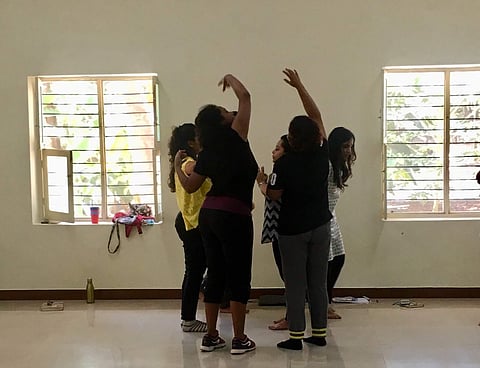

Tarana Khatri doesn't just look at dance as most of us do — as movement. She sees it as a way to move people who cannot connect with us using conventional, socially acceptable methods. Confused? Tarana is a psychology grad and a certified Dance Movement Therapist and she uses her moves to reach out to people who are affected, have special needs or just need some drawing out.
The Founder of Horizon Therapy Centre, Kilpauk, explains how her brand of therapy works, “In a nutshell, Dance Movement Psychotherapy is using the body and integrating it to process emotions and feelings,” says Tarana, adding, “It can be an analysis of your breath or other body sensations or even how you walk or the smallest of movement that your body makes or sequences of voluntary movement created to express something. It seldom involves dance choreography.”
Interestingly, both dancing and psychology have always been her passions. She has been dancing since the age of six, and has even trained at the Academy of Modern Danse, Chennai. “I mastered both hip-hop and jazz, and did a bit of ballet too,” she tells us. But she never really wanted to pursue a career in dance as she was always more interested in the human mind. She even thinks that ‘dance is more than choreography and performance, it is an expression and an emotion, comfort and solace’. “I completed my Bachelor’s in Psychology from Women’s Christian College and after that interned at RASA, a school for special needs children which uses theatre for holistic development. That’s when I came across an article on Tripura Kashyap who pioneered Creative Movement Therapy in India. And I remember thinking I wanted to do something on those lines,” Tarana recalls.
And soon enough, she went to the UK to pursue Dance Movement Psychotherapy at Queen Margaret University, Edinburgh, where she got to primarily deal with autistic children. “I learnt two things from my time with them. Firstly, language is not the method of communication. I communicated with special children using body language. Secondly, I was able to employ the idea of ‘building bridges.’ Usually, therapists try to groom special children to behave in socially-accepted ways and that’s that. But according to the idea of building bridges, the therapist sort of agrees that each person lives in their own bubble and encourages the children to find some common ground with the mainstream world,” she recalls.
She came back to India in 2014 and co-founded Synchrony, a platform that aims to encourage society to be more accepting of Creative Arts Therapy, with her friend Devika Mehta, a fellow Dance Movement Therapist, in 2014. Two years later, in 2016, she founded the Horizon Therapy Centre. Today, she has a slew of customers, ranging from adults to kids. Tarana’s sessions are guided by her, but driven entirely by the person who has come to her for help, be it an adult or a child. “What I try to do essentially is assess the state that they are in and then propose any movement-based activity or even use drama (a narrative or a story) to help them process what they’re struggling with,” she points out.
Tarana is also able to always find a balance between theory and practice. “Of course, since I have been trained in a certain discipline, I try to apply theoretical knowledge in my sessions, but it will never clash with where the client is at, in terms of progress. I believe that as a therapist, I am also able to identify patterns of responses or information, and explain these patterns to the clients so that they can develop the right kind of coping mechanism in turn,” she explains.
